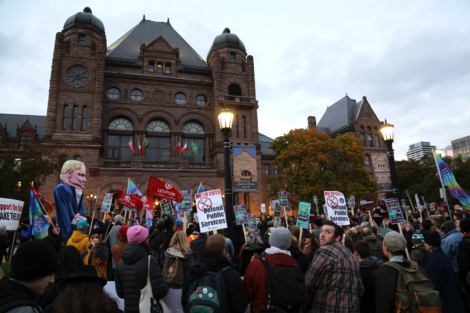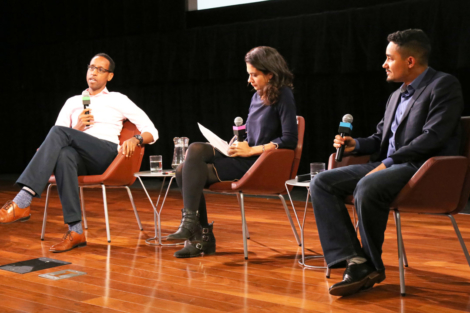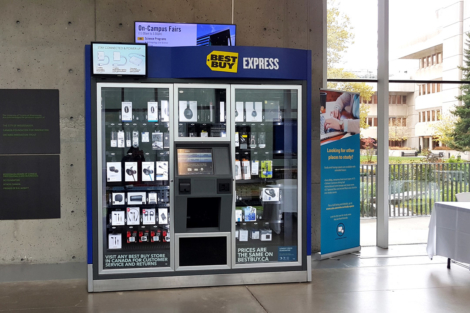Free speech emerged victorious
Re: “Arrests, violence at protest against Munk Debate hosting Steve Bannon”
Violence is the state’s last resort, and was, unfortunately, necessary to maintain order outside of the recent Munk Debate. While peaceful protest is permitted, the demeanour of some protestors quickly exceeded the boundaries of legal conduct. This made the police’s response appropriate.
Nonetheless, the entire event — both inside and outside of Roy Thompson Hall — was a microcosm of liberal democracy, with free speech emerging victorious. The debaters presented their convictions, while those outside exercised their rights to oppose them. No party was restricted. The expression of such contrasts is a positive sign of diversity and contributes to intellectual discourse, where citizens hear all opinions and make holistic decisions thereafter.
However, the cold wasn’t the only bitter presence that evening. Individuals ought to be civilised while exercising their rights. For some protesters — especially those shrieking at queued guests and using four-letter epithets — this was certainly not the case. These individuals seemed to be more bent on suppressing Bannon’s speech than merely opposing it.
This behaviour was fundamentally illiberal, given liberalism’s elevation of individual rights above all else. It speaks to an alarming trend of constitutional speech being contemporarily subordinated to subjective feelings and emotions, which have no basis in law.
Consider how students across college campuses demand ‘safe spaces’ for restricted speech — which is rather contrary to universities’ objectives of holistic education embracing diverse perspectives. These demands are made under the guise of ‘political correctness,’ with the definition of ‘correct’ favouring the liberal left more often than not.
Mick Hume rightly said that “there is no right not to be offended.” In a democracy, the definition of ‘correct’ speech is ultimately in the Constitution, given the subjectivity of morality. As such, Bannon’s speech was neither incorrect nor suppressible, and deserved a fair hearing.
To listen and disagree with civility is crucial, for the opposite furthers polarization, which prevents cooperation and breeds further suppression in a vicious cycle. While protesters were justified to oppose, they ought to have done so in line with liberal democracy’s code. Only then, perhaps, will society be improved.
Arjun Singh is a first-year Political Science student at New College.
The minimum wage freeze isn’t the end of the world
Re: “Provincial government to repeal Bill 148, targeting minimum wage, workplace legislation”

Labour group protests repeal of workplace legislation at Queen’s Park. SHANNA HUNTER/THE VARSITY
When the previous government announced that it would raise the minimum wage a couple of years ago, I thought it would be a great idea. I was working at a small, privately-owned fast food franchise at the time, and I couldn’t wait for the opportunity to buy that Big Mac combo for 50 per cent, rather than 90 per cent, of my hourly wage.
But what a lot of people missed was the fact that the second that wage went up, so did the price of everything else — sometimes to absurd levels. The franchise I was working at was overwhelmed almost immediately by the newly rising wages, and within mere weeks I found plenty of employees cut off the payroll.
Some friends of mine didn’t have the luxury of seeing their hours cut. Their Christmas gift was a layoff, not a healthier paycheck. Suddenly, we had fewer employees, dealing with the same rush.
And that Big Mac combo? Within a week, it wasn’t only back to 90 per cent, but in some cases, rose to the full weight of that newly raised check.
So, I am not necessarily upset over the freeze of the minimum wage at $14 an hour. Yes, it definitely helped pay some bills — car insurance isn’t necessarily dependent on wages — but it didn’t have the impact that some wished for. Within a couple of months, a few of my neighbourhood pharmacies and eateries had to close their doors, being overrun with costs.
Don’t get me wrong, as life gets more expensive, the minimum wage does need to go up. And in my opinion, $11.40 an hour was definitely too little. But, the sudden jump to $14 an hour was problematic and instead, a better balance of wages to inflation is necessary. The big jump is done. From next year onwards, we’ll hopefully see it grow organically.
Arik Portnov is a first-year Political Science student at Trinity College.
Making Toronto an inclusive global city is tough, but vital
Re: “‘Global City for Who?’ event addresses inclusivity in world’s top cities”

Toronto Star reporter Sara Mojtehedzadeh moderated a discussion on inequality. SHANNA HUNTER/THE VARSITY
If you have been tuning into talk in Toronto for the past few years, you know that breaking into the housing and job markets has proven notoriously difficult. In a panel held by U of T’s Geography and Planning department, Hashi Mohamed and Kofi Hope discussed strategies of ensuring that cities remain inclusive and accessible to all of their residents as they grow globally.
The divides seen in Toronto and many other cities highlight the fallacy of the ‘North American’ dream: the barriers present in our so called ‘global cities’ make it unfairly difficult for disenfranchised individuals to achieve their goals.
The class divides that make cities inaccessible then feed into racial and ethnic divides, which leads to the troubling segregation trends we see developing in Toronto. This creates a vicious cycle in which class divides are both the cause and consequence of ethnic division.
As Hope pointed out during the talk, “equity and inclusion” for everyone is the first step in making global cities inclusive for all residents. For Toronto, where nearly half of the residents were born outside of Canada, making an accessible global city is vital. Equity and inclusion may perhaps seem like too abstract a solution for such a pressing issue, but there is no quick and easy fix.
By taking steps in every aspect of city living to promote equity and inclusion, starting from education and going into corporate practices, Toronto can ensure that it is accessible to all.
Ori Gilboa is a first-year Humanities student at Victoria College.
We need better student health, not profit-driven vending machines
Re: “Four new branded vending machines added at UTM since summer”

A UTM spokesperson said the new vending machines have built-in anti-theft features. ZEAHAA REHMAN/THE VARSITY
In light of prolonged on-campus hours, UTM installed four new branded vending machines this past summer. Regardless of the good intentions behind the new vending machines, these additions evade legitimate changes to a troubling phenomenon in student life. Namely, overworked students are unable to afford themselves the time to meet their own needs, mental or physical.
In an expansion of what an administrator called “a second tier of products,” more luxury items have been introduced than legitimate necessities. Machines intended to replace campus food services for late nights and weekends aren’t focused on nutrition or satiating students’ diets, but rather on unnecessary specialty food items. And when it comes to school supplies, the trend continues — simple items like pens or notebooks are absent to accommodate expensive electronics.
Items like these allow students to spend money, but not to take care of themselves. Student life has become a state of personal neglect, and offerings like these do nothing to better campus quality of life. The age group most vulnerable to addiction and mental illnesses is not given adequate time to address nutrition, exercise, and sleep, all of which affect the progression of mental disorders.
Vending machines like these seek to profit from, not rectify, the unhealthy lifestyle of the student: late nights, short breaks, and long hours. Our hallways have become commercialized with metal boxes and the appeal of specialty coffees, Fitbits, and instant cameras. Instead, our university should focus on much-needed reforms to schedules and resources to help us live healthier student lives.
Ashley Manou is a first-year Humanities student at New College.


